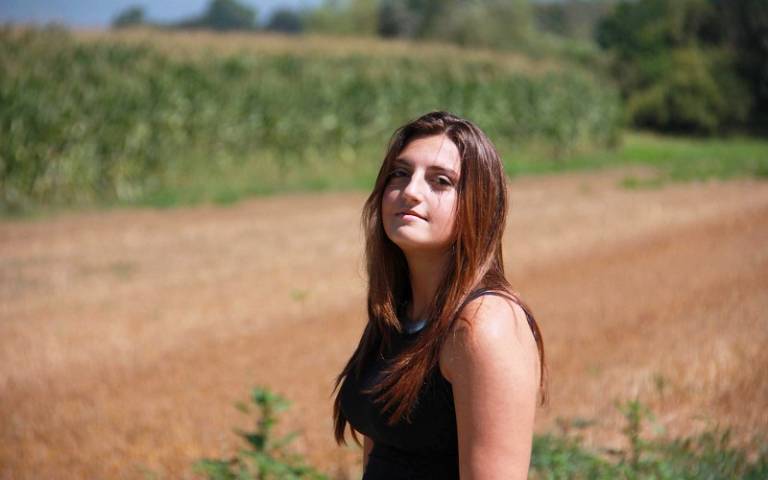Seven Questions with... Aglaia Freccero
7 May 2020
This week we meet Biomedical Sciences BSc student Aglaia Freccero, who is Chief Editor of Bioscience Horizons. Aglaia has been campaigning to support NHS healthcare professionals through an upcoming 12-hour fundraising writeathon – which she chats to us about here.

What are you studying, why are you interested in this subject and what do you plan to do in the future?
I am a second-year Biomedical Sciences BSc student. I consider scientific innovation essential for human progress, and I am very passionate about cell biology, with a particular focus on the complexity of neuronal systems subserving behaviour and the link between consciousness and psychopathology.
My interest in neuroscience matured last year, during my interruption of studies, when researching about my mental health condition brought more questions than answers.
Since September 2018, I started breaking the stigma around mental health and raising awareness among young people through scientific information on my blog.
I, therefore, aim to pursue a PhD in cellular neurobiology and a career in science writing, hoping to inspire and make my small contribution to humankind.
What is the most interesting thing you’ve done, seen or got involved with while at UCL?
I am Chief Editor of Bioscience Horizons. Bioscience Horizons is an open-access peer-reviewed journal, publishing outstanding undergraduate and master’s international research in the biosciences and insightful articles that disseminate bioscience awareness to the general public.
Bioscience Horizons ceased publication under Oxford University Press at the end of 2018. From January 2020, UCL took over the journal in association with UCLpress and its administration was handed over to UCL undergraduates. As Chief Editor, I look forward to developing Bioscience Horizons’ vision, thus remaining faithful to its fundamental principles. Stay tuned for our website launch!
We are now campaigning to support NHS healthcare professionals. As part of our “Writathon”, each of us will write for 12 hours (an NHS staff shift) over three days to collectively raise 1000 pounds and make the latest COVID-19 research articles accessible to the public to combat scientific misinformation.
Here's the link to donate.
Have you discovered any hidden gems during your time at UCL?
Thursday essential: the farmers’ market near campus (it is difficult to satisfy an Italian!). Check out the fresh pasta stall.
Give us your top three things to do/see/go to in London:
- Regent’s Park – the best place for long runs before lectures (or you can feed the squirrels!)
- Feed your artistic greed by getting lost in the Impressionists’ artworks at The National Gallery.
- Check out the temporary exhibitions at the Science museums to broaden your scientific interests.
If you were Provost for the day what one thing would you do?
According to the National Institute of Mental Health, 75% of lifetime cases of mental illness develop by age 24, making university students the most vulnerable age group. University involves significant changes which can bring about a significant amount of stress: leaving home for the first time, finding a work-life balance and taking care of our wellbeing. As Provost, I would prioritize students’ mental health by employing more resources into UCL Student Psychological and Counselling Services and Student Support and Wellbeing.
Who inspires you and why?
Rita Levi Montalcini, neurobiologist and Italian Nobel Laurate is an example of real resilience: she set up a laboratory in her bedroom during World War II to study neurogenesis in the chick embryo! She also advocated for scientific research funding and women in STEM.
What would it surprise people to know about you?
People are always shocked when I tell them that I am an Olympic gold medallist. In 2013, I won the International Children’s Winter Games in Short Track in Ufa, Russia (still counts!).
 Close
Close

